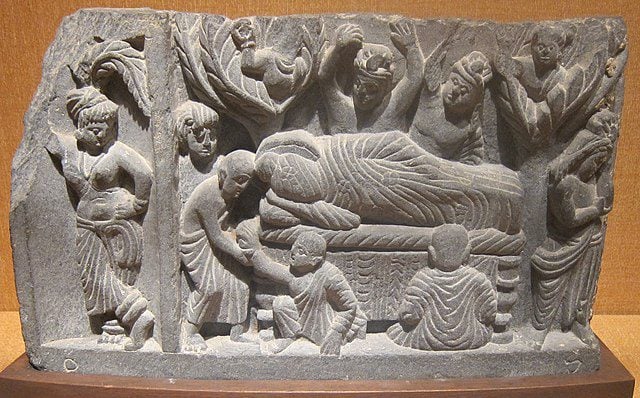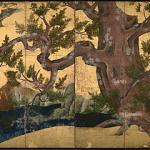“Make of yourself a light”
said the Buddha,
before he died.
I think of this every morning
as the east begins
to tear off its many clouds
of darkness, to send up the first
signal-a white fan
streaked with pink and violet,
even green.
An old man, he lay down
between two sala trees,
and he might have said anything,
knowing it was his final hour.
The light burns upward,
it thickens and settles over the fields.
Around him, the villagers gathered
and stretched forward to listen.
Even before the sun itself
hangs, disattached, in the blue air,
I am touched everywhere
by its ocean of yellow waves.
No doubt he thought of everything
that had happened in his difficult life.
And then I feel the sun itself
as it blazes over the hills,
like a million flowers on fire-
clearly I’m not needed,
yet I feel myself turning
into something of inexplicable value.
Slowly, beneath the branches,
he raised his head.
He looked into the faces of that frightened crowd.
Mary Oliver
When a Buddha Dies
Thanks to the Japanese embracing the Gregorian calendar during the the 15th of February, is observed as Parinirvana, the anniversary of Gautama Siddhartha’s death.
Mary Oliver in her imaginative retelling offers the Holy One’s last words as “make yourself a light.” A bit of literary license. But. There is a truth in that variation on the endless theme.
That good teacher did shine a light into many individual hearts. Those individual hearts he called to work diligently, to see through the transience of things, and to win some great victory on the other side of our grasping at things.
For those who like to think about such things, the principal text addressing this moment is the Mahaparinibbana Sutta. It is, at least by my reading, fairly obviously a digest of his teachings composed with an eye to the continuation of the community he led. Whether directly from his mouth or put together, as is more likely, by his admirers and successors, later. I have little doubt a fair amount of it was how shall we say, “enriched” by those who won the ensuing struggles for leadership.
For those familiar with New Testament studies, the text feels similar to that “Second Paul,” the author of First & Second Timothy & Titus, that address the young church full of institutional advice. And which are clearly from someone different than the ecstatic mystic who wrote or whose teachings are compiled as most of the other letters. It sure feels like we’re getting some of that in the Mahaparinibbana, a text not committed to writing until several hundred years after his death.
And then there are the Buddha’s last words. Captured in this ancient document it feels they had a magical quality, a halo around them, and are more likely than most things to be what he actually said. At least I think, as I said, feel, could be the case.
For us who are limited to English, there are various translations of them as recorded in the Mahaparinibbana Sutta.
One version goes:
All compounded things are subject to vanish. Strive with earnestness.
Another has it:
Experience is disappointing. It is through vigilance that you succeed.
And another reads:
All fabrications are subject to decay. Bring about completion by being heedful.
Still another:
All component things in the world are changeable. They are not lasting. Work hard to gain your own salvation.
Jane Hirshfield, a modern guide for us, adds in a point central to the Zen way, and then reframes much of this as a summary of our intimate way.
Everything changes;
Everything is connected;
Pay Attention.
In the original, as we receive it we get two points, an observation and an exhortation.
That third, about connection, is not asserted. But, I feel I can say contextually, it is implied. It certainly emerges with the Mahayana as critical.
But as to those specifics in the teacher’s putative last words.
The first continues a theme he touched on throughout his ministry, things are composed of parts, and anything composed of parts will come apart. And with that, any grasping will ultimately be thwarted. And with that frustration, unhappiness, dissatisfaction, dis-ease follow like night follows day.
And then the exhortation. It turns very much on volition, on his confidence that the individual, you and I, can win some victory through our sustained attention.
What that victory is he doesn’t spell out. Or, rather it is spelled out a bit differently in the various traditions that follow him.
I notice the different schools shift what that victory is a fair amount, ranging from separation and extinction to fully engaged without attaching to any result. Me, I’m not so inclined to that first view, and completely in accord with the second. Here we find the critical point of connection, of intimacy, of holding and letting go, of bringing the mysteries of attention to the great matter. It is at the heart of our Zen way.
This path is about the mystery of the many worlds encountered in this one. All the heavens. All the hells. All the many states and places.
Right here.
Just open your eyes, your ears, your hands, your heart.
Learn when to hold. Learn when to let go.
And so.
That old monk who gathered a small band around him probably in his early thirties and over many years preached a lot of sermons in a land so alien it is hard to even picture it much less comprehend it, teaching in a language lost to us and so recorded centuries after his death in languages he did not speak, sparked something.
A fire.
And that fire continues to burn.
Sort of a light shining into the darkness.
A great light guiding us home…















